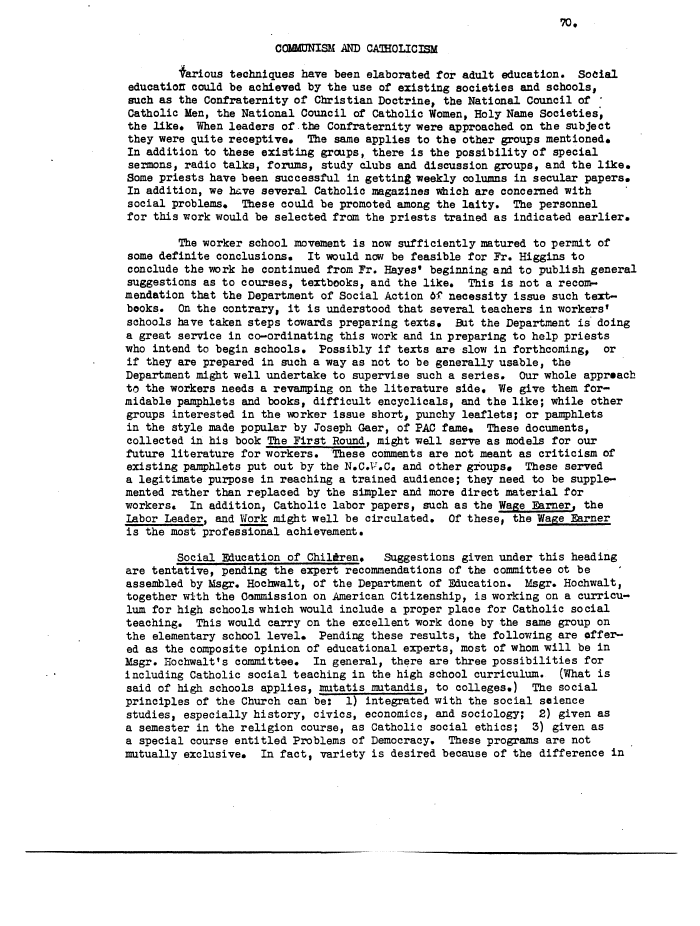 |
||||
 |
||||
| 70. COMMUNISM AND CATHOLICISM Various techniques have been elaborated for adult education. Social education could be achieved by the use of existing societies and schools, such as the Confraternity of Christian Doctrine, the National Council of ' Catholic Men, the National Council of Catholic Women, Holy Name Societies, the like* When leaders of the Confraternity were approached on the subject they were quite receptive. The same applies to the other groups mentioned* In addition to these existing groups, there is the possibility of special sermons, radio talks, forums, study clubs and discussion groups, and the like. Some priests have been successful in getting weekly columns in secular papers. In addition, we have several Catholic magazines which are concerned with social problems. These could be promoted among the laity. The personnel for this work would be selected from the priests trained as indicated earlier. The worker school movement is now sufficiently matured to permit of some definite conclusions. It would now be feasible for Fr. Higgins to conclude the work he continued from Fr. Hayes* beginning and to publish general suggestions as to courses, textbooks, and the like. This is not a recom- mendation that the Department of Social Action 6? necessity issue such text- books. On the contrary, it is understood that several teachers in workers' schools have taken steps towards preparing texts• But the Department is doing a great service in co-ordinating this work and in preparing to help priests who intend to begin schools. Possibly if texts are slow in forthcoming, or if they are prepared in such a way as not to be generally usable, the Department might well undertake to supervise such a series* Our whole approach to the workers needs a revamping on the literature side. We give them for- midable pamphlets and books, difficult encyclicals, and the like; while other groups interested in the worker issue short, punchy leaflets; or pamphlets in the style made popular by Joseph Gaer, of PAC fame. These documents, collected in his book The First Round, might well serve as models for our future literature for workers. These comments are not meant as criticism of existing pamphlets put out by the N.C.f'.C. and other groups. These served a legitimate purpose in reaching a trained audience; they need to be supple- mented rather than replaced by the simpler and more direct material for workers* In addition, Catholic labor papers, such as the Wage Earner, the Labor Leader, and Work might well be circulated. Of these, the Wage Earner is the most professional achievement. Social Education of Children. Suggestions given under this heading are tentative, pending the expert recommendations of the committee ot be assembled by Msgr. Hochwalt, of the Department of Education. Msgr. Hochwalt, together with the Commission on American Citizenship, is working on a curricu- lum for high schools which would include a proper place for Catholic social teaching. This would carry on the excellent work done by the same group on the elementary school level. Pending these results, the following are offer- ed as the composite opinion of educational experts, most of whom will be in Msgr. Hochwaltfs committee. In general, there are three possibilities for including Catholic social teaching in the high school curriculum. (What is said of high schools applies, mutatis mutandis, to colleges.) The social principles of the Church can be: 1) integrated with the social science studies, especially history, civics, economics, and sociology; 2) given as a semester in the religion course, as Catholic social ethics; 3) given as a special course entitled Problems of Democracy. These programs are not mutually exclusive. In fact, variety is desired because of the difference in |